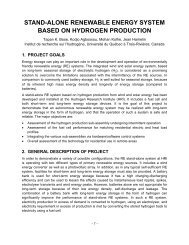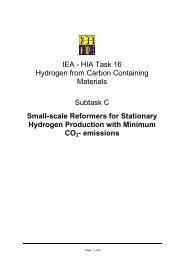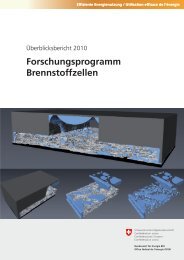Technology Status of Hydrogen Road Vehicles
Technology Status of Hydrogen Road Vehicles
Technology Status of Hydrogen Road Vehicles
You also want an ePaper? Increase the reach of your titles
YUMPU automatically turns print PDFs into web optimized ePapers that Google loves.
! HC and CO emissions from hydrogen vehicles with no after-treatment <strong>of</strong> exhaust gas are about an order<br />
<strong>of</strong> magnitude lower than HC and CO emissions from catalyst-equipped gasoline vehicles <strong>of</strong> similar age<br />
and engine condition;<br />
! CO 2 emissions will be lowered by two or more orders <strong>of</strong> magnitude, depending on the oil consumption<br />
<strong>of</strong> the engine;<br />
! hydrogen vehicles would emit or produce close to zero ozone, particulates, sulfates, sulfur oxides,<br />
aldehydes, benzene, and other toxic and carcinogenic compounds commonly found in the exhaust <strong>of</strong><br />
petroleum-fuel vehicles;<br />
! dual-fuel operation with hydrogen and gasoline or diesel fuel can substantially reduce emissions <strong>of</strong> all<br />
regulated pollutants.<br />
.......<br />
It (also) appears that LH 2 vehicles may be quieter that gasoline vehicles, and hydride vehicles louder, but it<br />
is not known if this difference is important.<br />
Concerning hydrogen vehicles and the Greenhouse effect, the use <strong>of</strong> hydrogen made from non-fossil electricity<br />
and water is one <strong>of</strong> the most effective ways to reduce anthropogenic emissions <strong>of</strong> Greenhouse gases.<br />
.......<br />
On the other hand, the use <strong>of</strong> coal to make hydrogen would cause a substantial increase in emissions (per km)<br />
<strong>of</strong> Greenhouse gases....(up to) 100 % (hydride vehicles) and 143 % (LH 2 vehicles) with respect to current<br />
emissions <strong>of</strong> Greenhouse gases from petroleum use.<br />
Ironically, it thus turns out that hydrogen is either the best or the worst fuel from a Greenhouse perspective,<br />
depending on the feedstock...... <strong>Hydrogen</strong> from non-fossil power, or a combination <strong>of</strong> electric vehicles and<br />
ICE vehicles using bi<strong>of</strong>uels, would be the only effective long-term options for eliminating emissions <strong>of</strong><br />
Greenhouse gases from transportation sector.<br />
.......<br />
Much more water vapor is formed by hydrogen combustion than by the burning <strong>of</strong> fossil fuels. Moreover,<br />
water vapor is actually the most important Greenhouse gas in the atmosphere, controlling many times more<br />
infrared flux than CO 2. However, even if hydrogen replaced all fossil fuels world-wide, the increase in water<br />
vapor emissions would amount to only 0.003 % <strong>of</strong> global evaporation. This is a negligible amount... (but)<br />
some monitoring over the long term might be prudent, since small changes in water vapor or cloud cover can<br />
significantly affect climate.<br />
47













